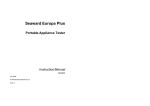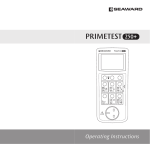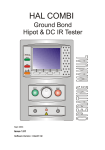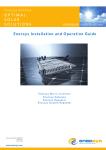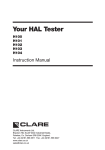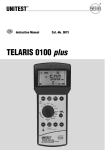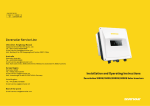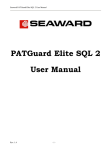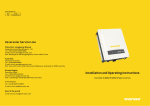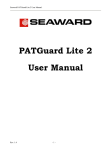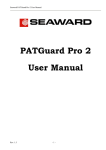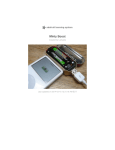Download Europa Pac Plus Manual
Transcript
Seaward Europa Plus Portable Appliance Checker Instruction Manual 293A552 Rev 1.0 December 2002 © 2002 Seaward Electronic Ltd. Issue 1.0 Limited Warranty & Limitation of Liability SEAWARD Electronic Limited guarantees this product for a period of 1 year. The period of warranty will be effective at the day of delivery. © Copyright 2002 All rights reserved. Nothing from this edition may be multiplied, or made public in any form or manner, either electronically, mechanically, by photocopying, recording, or in any manner, without prior written consent from SEAWARD Electronic Limited. This also applies to accompanying drawings and diagrams. Due to a policy of continuous development SEAWARD Electronic Limited reserves the right to alter the equipment specification and description outlined in this publication without prior notice and no part of this publication shall be deemed to be part of any contract for the equipment unless specifically referred to as an inclusion within such contract. Table of Contents Declaration of Conformity.......................................................... 1 Before Starting .......................................................................... 2 Safety ........................................................................................ 3 CHAPTER 1 INTRODUCING THE TESTER ................. 5 Introduction................................................................................ 5 Your Portable Appliance Checker ............................................. 6 The Top Panel................................................................. 7 The Keyboard ............................................................................ 8 The Rotary Switch ..................................................................... 9 Definitions.................................................................................. 9 CHAPTER 2 USING THE TESTER ............................. 10 Introduction.............................................................................. 10 Controls ......................................................................... 10 Display........................................................................... 10 Connecting the Tester ............................................................. 12 Set-Up Data............................................................................. 12 Beeper Setting .............................................................. 12 Substitute Leakage Setting ........................................... 12 Leakage Test Setting .................................................... 12 Performing a Test.................................................................... 12 After a Test.................................................................... 12 Abort Actions................................................................. 12 Storing Test Results ................................................................ 12 Set Date ........................................................................ 12 Appliance Number and Storing Results........................ 12 Memory Options............................................................ 12 i Table of Contents Send Data................................................................................ 12 Download Data Format ................................................. 12 AC Earth Continuity Tests ....................................................... 12 DC Earth Continuity Tests....................................................... 12 Insulation Tests ....................................................................... 12 Substitute Leakage Test.......................................................... 12 Powered Tests ........................................................................ 12 Differential Leakage Test ........................................................ 12 Touch Leakage Test................................................................ 12 Load Test................................................................................. 12 External Leakage Test ............................................................ 12 IEC Lead Test ......................................................................... 12 Testing 110v Appliances ......................................................... 12 CHAPTER 3 TIPS & TROUBLESHOOTING............... 12 Tester Self Tests: .................................................................... 12 Powered Tests ........................................................................ 12 Temperature monitoring .......................................................... 12 Multiple Earth connections: ..................................................... 12 Interfacing................................................................................ 12 CHAPTER 4 MAINTAINING THE TESTER................. 12 Cleaning the Tester ................................................................. 12 User Maintenance ................................................................... 12 CHAPTER 5 ACCESSORIES...................................... 12 Standard Accessories ............................................................. 12 Optional Accessories............................................................... 12 ii Table of Contents CHAPTER 6 SPECIFICATIONS.................................. 12 AC Earth Continuity Test......................................................... 12 DC Earth Continuity Test......................................................... 12 Insulation Test ......................................................................... 12 Substitute Leakage Test.......................................................... 12 Differential Leakage ................................................................ 12 Touch Leakage........................................................................ 12 Load Test................................................................................ 12 External Leakage .................................................................... 12 Lead Test................................................................................. 12 Mechanical .............................................................................. 12 Environmental ......................................................................... 12 APPENDIX .................................................................... 12 Test Limits ............................................................................... 12 Earth Continuity Limit .............................................................. 12 Insulation Resistance Limits.................................................... 12 Protective Conductor / Touch Current Limits .......................... 12 iii Declaration of Conformity Declaration of Conformity for the Seaward Europa Portable Appliance Checker Manufactured by: Seaward Electronic Ltd, Bracken Hill, South West Industrial Estate Peterlee, County Durham, SR8 2SW, England Millennium Statement This product is Millennium compliant, and conforms fully to the document BSI DISC PD2000-1. Statement of Conformity Based on test results using appropriate standards, the product is in conformity with Electromagnetic Compatibility Directive 89/336/EEC and Low Voltage Directive 73/23/EEC Standards used: EN 61010-1 (1993) Safety Requirements for Electrical Equipment for Measurement, Control, and Laboratory Use EN 50081-1 (1992) Electromagnetic Compatibility. Generic Emission Standard: EN55022 Class B EN 50082-1 (1992) Electromagnetic Compatibility. Generic Immunity Standard: IEC1000-4-2, -4-3, -4-4, -4-5 The tests have been performed in a typical configuration. This Conformity is indicated by the symbol Européenne 1 , i.e. “Conformité Before Starting Before Starting Upon receipt of your Europa PAC Plus Tester:1. Check that all the component parts are present:• Seaward Europa PAC Plus Tester • Earth Continuity lead • 110v Adaptor • PATSLite Software disc • Computer Lead • Instruction Manual • Carrying Case 2. Read the operating instructions fully before conducting any tests. 3. Contact Seaward Electronic if you need information on training for Portable Appliance Testing. Courses can be arranged at Seaward, or at customer premises. 4. Seaward Electronic Limited can be contacted at: Bracken Hill South West Industrial Estate Peterlee Co. Durham SR8 2SW Tel : +44 (0)191 586 3511 Fax: +44 (0)191 586 0227 [email protected] 2 Safety Safety Note Please read the following Safety Instructions before use ! Safety Precautions The manual contains specific warning and caution statements where they apply. A Warning will identify the conditions and actions that pose hazard(s) to the user. A Caution will identify the conditions and actions that may damage the Tester. Symbols used within this manual and on the Tester are shown below: Risk of electric shock Warning of potential hazard Conformité Européenne Use of the instrument in a manner not specified may impair safety. Read the following safety information carefully before attempting to operate the instrument. 3 Safety Warning Due to the potential hazards associated with any electrical circuit it is important that the user is familiar with the instructions covering the capabilities and operation of this instrument. The user should ensure that all reasonable safety precautions are followed and if any doubt exists should seek advice before proceeding. This product is designed for use by suitably trained competent personnel and should be operated strictly in accordance with the instructions supplied. Failure to comply with these instructions may expose the user to electrical hazard This Tester performs a number of electrical tests which involve high voltages and high currents. Never touch the appliance being tested, or the test leads, whilst a test is in progress. Always check all test leads for signs of damage prior to use. Never use damaged or defective leads. Always ensure the mains supply to the Tester provides an adequate earth. This manual contains information and warnings which must be heeded to ensure user safety during operation. It is essential that this manual is read fully before proceeding with any tests. Should the Tester behave abnormally do not continue with the testing. Disconnect immediately and contact Seaward Electronic for servicing (see Chapter 4 - Maintaining the Tester). 4 Introduction Chapter 1 Introducing the Tester Introduction The Seaward Europa Plus Portable Appliance Checker is a powerful tool to assist in the analysis of the safety of portable electrical and electronic equipment. A range of tests are provided, with innovative features to aid difficult test situations, which allow testing of a wide variety of equipment. The Tester combines state of the art testability with the following innovative features:• Truly portable, multi-voltage tester • Accurate earth continuity and leakage measurement even when multiple earth paths exist • Tests Information Technology equipment • Can measure Leakage through optional Clamp • Stores up to 100 Test Results in memory • Downloads to PATSLite and PATGuard Plus • Connects to a printer to print results • Fast Start-up • Large, easy to read digital display • Easy test selection 5 Your Portable Appliance Checker Your Portable Appliance Checker Item Number Part 1 Europa Plus Portable Appliance Checker 2 Carrying case 3 Earth Continuity Lead 4 Computer Lead 5 PATSLite software disc 6 Instruction Manual 7 110v Adaptor 6 Your Portable Appliance Checker The Top Panel Item Number Part 1 Mains socket 2 Main Earth Continuity/Insulation socket 3 RS232 Serial Interface 4 230V Mains Input 5 IEC Lead Socket 6 Auxiliary Earth Continuity socket, for point to point earth continuity measurement 7 The Keyboard The Keyboard Item Number Part 1 Rotary Switch 2 SELECT Button 3 CHANGE DISPLAY Button 4 Cursor Buttons 5 STORE RESULT Button 6 START / STOP Button 8 The Rotary Switch The Rotary Switch Definitions Equipment Under Test The electrical / electronic apparatus (EUT) which is the subject of testing. Powered Tests - The EUT is supplied with mains voltage, with measurements being taken of power consumption, leakage currents etc. Tester - The Seaward Europa Portable Appliance Checker Un-powered Tests - The EUT is the subject of electrical tests using stimuli generated within the Tester. The EUT is not provided with mains power. User - The test technician using the Tester to perform tests on an EUT 9 Introduction Chapter 2 Using the Tester Introduction Controls A rotary switch defines the basic test (or action) to be performed, the tests are arranged on the switch such that a clockwise rotation is needed to perform a normal sequence of tests. Cursor buttons ( ↑ and ↓ ) allow for adjustment of test variables, e.g. test duration. The SELECT button is used to change the variable to be adjusted. The large START/STOP button is used to start a Test. Display Test Icons Primary Display Secondary Display The display consists of a number of Icons to provide visual indication of the tester status, a primary 4 digit, 7 segment display, along with a 4 digit secondary display, and a 2 digit duration time display, Test Icons Indicates the test selected, 10 Introduction Earth Continuity Insulation Substitute Leakage Differential Leakage External Leakage Touch Leakage Load Lead Test Test in Progress Icon Indicates test in progress with voltage warning. Low Voltage High Voltage Applying Mains Power Test Duration Counter Indicates the timing of the test. This will count down, when the counter reaches zero if the Europa is still taking a measurement the counter will flash. 11 Connecting the Tester Primary Display Indicates test result Secondary Display Before and during a test this display Indicates test output e.g. voltage or current specified. After a test, this display compares the test result with standard limits. Connecting the Tester The Tester must be powered by a 230V supply but can test both 230v and 110v appliances (see Testing 110v Appliances). The supply to the tester must include an earth connection (e.g. via a 3 pin plug). When switched on, the Tester will carry out a short self-test procedure (approximately 4 seconds). During this test, all display segments will be lit to allow verification of correct operation of the display Once the start-up procedure of the Tester has been completed, the tester is ready for operation. The display will depend on the rotary knob position. Set-Up Data There are a number of settings that enable the user to set up the tester to perform in a particular manner. These are available by turning the rotary knob to the Set-Up Data position. Beeper Setting Different beep settings can be configured. With the primary display flashing the user can cycle through the current beep settings using the cursor buttons. Each option is described below. ton1 – Beep at key press ton2 – Beep at start of test and at end of test, if test Pass beep twice at end 12 Set-Up Data ton3 – Beep when mains voltage applied to test socket ton4 – Beep if test limit exceeded To set the selected option to off or on press the SELECT button. Now the option’s setting will flash, use the cursor buttons to chose the preferred setting, then press the STORE RESULT to go back to the options. At any time you can switch the rotary knob to a different selection and the current beep options will be active. Substitute Leakage Setting The Substitute Leakage can be set to display the reading for different set level increases in mains voltage. These are: 230v = 0% 244v = 6% 253v = 10% With the primary display flashing cycle through the settings until SubS is displayed using the cursor buttons. To set the selected option, press the SELECT button. Now the option’s setting will flash, use the cursor buttons to chose the preferred setting, then press the STORE RESULT to go back to the options. At any time you can switch the rotary knob to a different selection and the current option will be active. Leakage Test Setting If a Leakage test exceeds the display range, the test can be stopped or allowed to carry on. With the primary display flashing cycle through the settings until SEt1 is displayed using the cursor buttons. To set this option to off or on press the SELECT button. Now the option’s setting will flash, use the cursor buttons to chose the preferred setting, then press the STORE RESULT to go back to the options. At any time you can switch the rotary knob to a different selection and the current options will be active. 13 Performing a Test Performing a Test All tests are performed in a similar way - Rotate the switch to the appropriate test. For un-powered tests the test duration will be flashing in the top left corner. Use the cursor buttons to change the test time if required. Press the SELECT button to set other options for the test. For most tests a test limit can also be set. Use the cursor buttons to select pre-defined limits or the user adjustable limit indicated by a plus (+) to the left of the limit. For details on test settings refer to the actual tests in this Instruction Manual. When satisfied with the test conditions, press the START/STOP button to start the test After a Test After the Tester completes the selected test, the measured value continues to be displayed until a button is pressed, or a different test is selected. The Secondary display provides a comparison with standard test values. Abort Actions A test can aborted at any time by rotating the rotary switch. Note however that due to the functionality of the Load, Leakage and Touch Leakage tests the rotary knob must be rotated beyond these tests before they will be aborted. Storing Test Results The Europa PAC plus is able to store test results. To store results perform the required test and press STORE RESULTS. Please note that timed tests can only be stored at the end of the test while tests which are continuous can be stored during and at the end of the result. Set Date As the date is required to be stored with each test result the first time you store a result the tester prompts you to enter the dat. 14 Storing Test Results The first time the STORE RESULT button is pressed after switch on after performing a test the user will be prompted to enter the date. The primary display will flash dAt for approximately 2s then display the currently set day / month e.g. 12.07 for 12 July. The secondary display will show the currently set year. The leading day digit will be flashing, indicating that it can be changed. Use the cursor buttons to change the value. Press the SELECT button to allow the second day digit to be changed, indicated by the digit flashing. Use the cursor buttons to change its value. Press the SELECT button to allow the month to be changed. Proceed to change the month in the same way as the day. After the month is changed, the year can be changed in the same manner. At any time (when the entire date is correct) pressing the STORE RESULT button will cause the tester to check the date is valid and if correct will store it to memory. Invalid dates will not be stored. All subsequent result stores will not ask for the date until the tester is reset. Press STORE RESULT to store the displayed date. At any time during the date entry, pressing the CHANGE DISPLAY button or rotary switch action cancel any changes and leave the date unchanged in memory. Appliance Number and Storing Results After the date has been stored or has been set on a previous store, pressing the STORE RESULTS button will cause the primary display to flash STOR for about 2s then both primary and secondary displays will display four digits each (eight total) with the lead digit flashing. Use the cursor buttons to change the value of the digit. Pressing the SELECT button will cause the next digit in turn to flash indicating that its value can be changed using the cursor buttons. Use the SELECT button to select each digit in turn changing the value if appropriate with the cursor buttons until the correct appliance number is displayed. Press the STORE RESULT button to store the displayed appliance number. The tester will display STOR on the primary display with the secondary display alternating between ‘----‘ and a memory location for approximately 2s. Confirmation that the result has been stored is signaled by two short beeps. 15 Storing Test Results If the memory is full when attempting to store a result the primary display will show STOR with the secondary display flashing Full. Memory Options There are three options available: • Recall result • Delete last result • Delete all data • Memory available Move the rotary switch to Data Look Up, use the cursor buttons to select a memory option. Recall Result Use the cursor buttons to select rCL. Press the SELECT button to select this option. The two digits in the top right hand corner indicate appliance location. The primary display shows the measured value. The secondary display shows the test limit. The type of test is indicated by the test icon. The cursor buttons are use to move through the memory locations. On initial entry into recall result the last saved memory location is displayed. If an attempt is made to recall a result outside of the saved memory range a message is displayed. Attempting to recall below the first saved result will cause bot to be displayed. Attempting to recall above the last saved result will cause the toP to be displayed. Delete Last Result Use the cursor buttons to select CLr. Press the SELECT button to select this option. The two digits in the top right hand corner indicate memory location. The primary display shows the measured value. The secondary display shows the test limit. The type of test is indicated by the test icon. Only the last result in memory can be deleted. 16 Send Data To delete the result press the START / STOP button. While erasing the result secondary display will flash ‘----‘. After deleting the result the memory location number will be decremented by one. Delete All Data Use the cursor buttons to select Clr on the primary display with ALL on the secondary display. Press the SELECT button to select this option. Press the START / STOP button to delete all data. Both primary and secondary displays will flash, awaiting confirmation. To confirm that you wish to delete all data press the START / STOP button again. Memory Available Use the cursor buttons to select STOR. Press the SELECT button to select this option. The two digits in the top right hand corner indicate memory location last used. The secondary display indicates the percentage of free memory available. Send Data To print the test results stored in memory or to download them to an appropriate PC program, select Send Data with the rotary switch. Note Only the PATSLite program (supplied with the tester) and the PATGuard Plus program are capable of processing test results from the Europa PAC Plus. The primary display will alternate between Send and PrSt indicating press START / STOP button to commence sending data. With the printer connected and on-line or with the program awaiting test results, press the START / STOP button. While sending data the primary display will show Send with the secondary display showing ‘----‘. When complete the primary display will show End. 17 AC Earth Continuity Tests Note All of the current contents of memory are sent. It is not possible to be selective. Download Data Format The data format will be as follows for Appliance Tests: TEST NUMBER DATE APP NO EARTH (10A) INS (250V) SUB LKGE DIFF LKGE TOUCH LKGE EXT LKGE LOAD VOLTS CURRENT 002 18/05/02 12345678 0.01Ohm P 8.00MOhm P 0.24mA P 0.30mA P 0.30mA P 0.28mA P 3.68kVA 230V 5.65A The data format will be as follows for Lead Tests: TEST NUMBER 001 DATE 19/05/02 APP NO 12345679 EARTH (100mA) 0.03Ohm P INS (500V) >99.99MOhm P POLARITY PASSED The last test block is indicated by: END OF DATA AC Earth Continuity Tests 18 AC Earth Continuity Tests Switch Position ------------ Earth Continuity A~ Test Icon Displayed --Class 1 (earthed) appliances Plug the EUT into the tester outlet socket, connect the Earth Continuity lead from its socket to the appliance metal part. Class 2 (unearthed) appliances This test cannot be performed since no earth connection is present in the appliance plug. Test Description This test is to ensure that the connection between the earth pin in the mains plug of the appliance and the metal casing of the appliance is satisfactory and of sufficiently low resistance. The 10A test current is applied between the earth pin of the mains supply plug and the earth continuity test lead clip. A high current is normally used to stress the connection under fault conditions. The length of the test should be limited to prevent damage due to overheating. User Selectable Settings Each press of the SELECT button will allow you to cycle through the user selectable settings; test duration and test limit. The currently selected setting will be flashing. Test Duration With the test duration flashing, use the cursor keys to step through the test duration settings. A test duration can be set from 2s to 10s in 1s steps. 19 DC Earth Continuity Tests Press the SELECT button to change to another setting or press the START/STOP button to perform the test if the other settings are acceptable. Test Limit With the secondary display flashing and indicating resistance (Ω displayed), use the cursor keys to step through the test limits available and stop with the appropriate limit displayed. A special limit indicated by a plus sign (+) to the left of the limit, is a user adjustable limit. To set your own limit, with this user adjustable limit flashing press both cursor keys together. The limit as a whole will stop flashing with the most significant digit flashing. Use the cursor buttons to set a value for the flashing digit. Press the SELECT button to enable the next digit in turn to flash. Use the cursor buttons to set a value for this flashing digit. Then press the SELECT button to move to the next digit. Repeat these actions until all digits are set to your chosen value. Press the STORE RESULT button to set the limit. Press the SELECT button to change to another setting or press the START/STOP button to perform the test if the other settings are acceptable. DC Earth Continuity Tests Switch Position ----------Earth Continuity Test Icon Displayed --- Class 1 (earthed) appliances Plug the EUT into the tester outlet socket, connect the Earth Continuity lead from its socket to the appliance metal part. 20 DC Earth Continuity Tests Class 2 (unearthed) appliances This test cannot be performed since no earth connection is present in the appliance plug. Test Description This test is to ensure that the connection between the earth pin in the mains plug of the appliance and the metal casing of the appliance is satisfactory and of sufficiently low resistance. The test current is applied between the earth pin of the mains supply plug and the earth continuity test lead clip. User Selectable Settings Each press of the SELECT button will allow you to cycle through the user selectable settings; test duration and test limit. The currently selected setting will be flashing. Test Duration With the test duration flashing, use the cursor keys to step through the test duration settings. A test duration can be set from 2s to 60s in 1s steps or a continuous measurement indicated by two dashes (--). When a fixed test duration is set, the time will be divided into two equal periods. During the first period a test current of +200mA will be applied. During the second period a test current of –200mA will be applied. If a continuous test duration is set then, the first press of the START/STOP button will generate a +200mA test current continuously. Pressing the START/STOP button again will stop the test. Pressing the START/STOP button a third time will generate a – 200mA test current. Press the SELECT button to change to another setting or press the START/STOP button to perform the test if the other settings are acceptable. Test Limit 21 Insulation Tests With the secondary display flashing and indicating resistance (Ω displayed), use the cursor keys to step through the test limits available and stop with the appropriate limit displayed. A special limit indicated by a plus sign (+) to the left of the limit, is a user adjustable limit. To set your own limit, with this user adjustable limit flashing press both cursor keys together. The limit as a whole will stop flashing with the most significant digit flashing. Use the cursor buttons to set a value for the flashing digit. Press the SELECT button to enable the next digit in turn to flash. Use the cursor buttons to set a value for this flashing digit. Then press the SELECT button to move to the next digit. Repeat these actions until all digits are set to your chosen value. Press the STORE RESULT button to set the limit. Press the SELECT button to change to another setting or press the START/STOP button to perform the test if the other settings are acceptable. Insulation Tests Switch Positions ------------ 250V / 500V Insulation Test Icon Displayed --- Warning 250 or 500V d.c. test voltage Class 1 (earthed) appliances Plug the EUT into the tester outlet socket Class 2 (unearthed) appliances Plug the EUT into the tester outlet socket, connect the Earth Continuity lead from the Main socket to the appliance metal part. 22 Insulation Tests Test Description This test is used to verify that adequate insulation exists between the mains supply pins and earth. During the insulation test, a 250V or 500V DC voltage is applied between the earth pin and both the live and neutral pins of the appliance mains supply plug. The Tester displays the resistance measured and allows the user to confirm sufficient insulation exists. For Class 2 appliances, the Earth Continuity Test is used for an earth return lead. For appliances which incorporate over-voltage protection, and hence produce a false failure condition when 500v insulation tests are used, a 250V test voltage is provided to allow a reading to be taken without the protection devices generating a false failure. User Selectable Settings Each press of the SELECT button will allow you to cycle through the user selectable settings; test duration, test voltage and test limit. The currently selected setting will be flashing. Test Duration With the test duration flashing, use the cursor keys to step through the test duration settings. A test duration can be set from 2s to 60s in 1s steps or a continuous measurement indicated by two dashes (--). Press the SELECT button to change to another setting or press the START/STOP button to perform the test if the other settings are acceptable. Test Voltage With the secondary display flashing and indicating voltage (v displayed), use the cursor keys to step through the test voltage options. A 250V or 500V test voltage can be set. Test Limit With the secondary display flashing and indicating resistance (MΩ displayed), use the cursor keys to step through the test limits available and stop with the appropriate limit displayed. 23 Substitute Leakage Test A special limit indicated by a plus sign (+) to the left of the limit, is a user adjustable limit. To set your own limit, with this user adjustable limit flashing press both cursor keys together. The limit as a whole will stop flashing with the most significant digit flashing. Use the cursor buttons to set a value for the flashing digit. Press the SELECT button to enable the next digit in turn to flash. Use the cursor buttons to set a value for this flashing digit. Then press the SELECT button to move to the next digit. Repeat these actions until all digits are set to your chosen value. Press the STORE RESULT button to set the limit. Press the SELECT button to change to another setting or press the START/STOP button to perform the test if the other settings are acceptable. Substitute Leakage Test Substitute Leakage Switch Position -----------Test Icon Displayed --- Class 1 (earthed) appliances Plug the EUT into the tester outlet socket. Class 2 (unearthed) appliances Plug the EUT into tester outlet socket, connect the Earth Continuity lead from its socket to the appliance metal part. Test Description The substitute leakage test applies a nominal voltage of 40V AC RMS to the appliance and is applied between the earth pin and both the live and neutral pins of the supply plug. For Class II appliances, connect the Earth Continuity test clip to the appliance as a substitute for the Earth. 24 Substitute Leakage Test The Tester measures the current that flows and scales the result to display a guide to the current that would flow if the test voltage had been the nominal mains supply voltage. Please note that values for Substitute Leakage may differ substantially from that of conventional Earth Leakage tests because of the way that the test is performed (e.g. it will be affected by the presence of Neutral-to-Earth suppression devices). This test can prove useful in situations where conventional Insulation tests are unacceptable. User Selectable Settings Each press of the SELECT button will allow you to cycle through the user selectable settings; test duration and test limit. The currently selected setting will be flashing. Test Duration With the test duration flashing, use the cursor keys to step through the test duration settings. A test duration can be set from 2s to 60s in 1s steps or a continuous measurement indicated by two dashes (--). Press the SELECT button to change to another setting or press the START/STOP button to perform the test if the other settings are acceptable. Test Limit With the secondary display flashing and indicating current (mA displayed), use the cursor keys to step through the test limits available and stop with the appropriate limit displayed. A special limit indicated by a plus sign (+) to the left of the limit, is a user adjustable limit. To set your own limit, with this user adjustable limit flashing press both cursor keys together. The limit as a whole will stop flashing with the most significant digit flashing. Use the cursor buttons to set a value for the flashing digit. Press the SELECT button to enable the 25 Powered Tests next digit in turn to flash. Use the cursor buttons to set a value for this flashing digit. Then press the SELECT button to move to the next digit. Repeat these actions until all digits are set to your chosen value. Press the STORE RESULT button to set the limit. Press the SELECT button to change to another setting or press the START/STOP button to perform the test if the other settings are acceptable. Powered Tests Warning Mains voltage applied to appliance The following powered tests differ from the previous tests in that they apply mains supply voltage to the appliance to perform their functions:• Differential Leakage • Touch Leakage • Load Note These tests are not available when using the 110v adaptor. The Tester performs an initial low voltage test to establish that the appliance can be safely powered. When the rotary switch is rotated through the different power tests the power supply is not interrupted but the test counter is reset. This allows the user to obtain results from all three tests without having to interrupt the power. To abort a power test rotate the knob beyond the power tests. Warning It is important that the user verifies that an appliance with moving parts (e.g. an electric drill) is safely mounted to allow movement without causing damage to equipment or personnel. 26 Differential Leakage Test If the potential load current is too high, a warning message appears, allowing the user to continue. This message will be displayed if a Live to Neutral short exists, and if tests are continued the tester’s fuses will blow. If the potential load current is low, a warning message appears to allow the user to check that the appliance is switched on, and all fuses are intact. The Tester also performs an internal safety test to verify that internal relays are properly set before applying full mains supply to the appliance. Differential Leakage Test Switch Position ------------ Differential Leakage Test Icon Displayed --Warning Mains voltage applied to appliance All Appliances Plug EUT into tester outlet socket Test Description The Differential Leakage Test shows the current being lost through Leakage as the difference in the currents flowing in the Live and the Neutral conductors. This difference is the total leakage current from the appliance, and is generally equivalent to the current flow through the earth lead of the appliance. The test result is displayed in milliamps (mA). 27 Touch Leakage Test This differential method of determining leakage will show the full leakage of an appliance in-situ, so if the appliance has an extra earth point, e.g. a water pipe, then the Tester will show the full and true appliance leakage current. Test Duration The test is continuous and is stopped by either pressing the START/STOP button or by switching to an un-powered test. In both cases the test will be stopped and the power to the appliance removed. Switching to another powered test will stop the previous test and start the new test without interrupting power to the appliance. User Selectable Settings Only the test limit can be set by the user for this test. Test Limit With the secondary display flashing and indicating current (mA displayed), use the cursor keys to step through the test limits available and stop with the appropriate limit displayed. A special limit indicated by a plus sign (+) to the left of the limit, is a user adjustable limit. To set your own limit, with this user adjustable limit flashing press both cursor keys together. The limit as a whole will stop flashing with the most significant digit flashing. Use the cursor buttons to set a value for the flashing digit. Press the SELECT button to enable the next digit in turn to flash. Use the cursor buttons to set a value for this flashing digit. Then press the SELECT button to move to the next digit. Repeat these actions until all digits are set to your chosen value. Press the STORE RESULT button to set the limit. Press the SELECT button to change to another setting or press the START/STOP button to perform the test if the other settings are acceptable. Touch Leakage Test Switch Position ------------ Touch Leakage Test Icon Displayed --28 Touch Leakage Test Warning Mains voltage applied to appliance All Appliances Plug EUT into tester outlet socket, use Earth Continuity lead from Main socket to appliance metal part. Test Description The Touch Leakage Test displays the leakage current that would flow if the appliance was touched by a person. The Tester detects any current flowing in the Earth Continuity Lead (attached to an appropriate point on the appliance) and indicates the potential leakage through a metal panel. The Tester displays the result in milliamps (mA). Test Duration The test is continuous and is stopped by either pressing the START/STOP button or by switching to an un-powered test. In both cases the test will be stopped and the power to the appliance removed. Switching to another powered test will stop the previous test and start the new test without interrupting power to the appliance. User Selectable Settings Only the test limit can be set by the user for this test. Test Limit With the secondary display flashing and indicating current (mA displayed), use the cursor keys to step through the test limits available and stop with the appropriate limit displayed. A special limit indicated by a plus sign (+) to the left of the limit, is a user adjustable limit. 29 Load Test To set your own limit, with this user adjustable limit flashing press both cursor keys together. The limit as a whole will stop flashing with the most significant digit flashing. Use the cursor buttons to set a value for the flashing digit. Press the SELECT button to enable the next digit in turn to flash. Use the cursor buttons to set a value for this flashing digit. Then press the SELECT button to move to the next digit. Repeat these actions until all digits are set to your chosen value. Press the STORE RESULT button to set the limit. Press the SELECT button to change to another setting or press the START/STOP button to perform the test if the other settings are acceptable. Load Test Switch Position ------------ Load Test Icon Displayed --- Warning Mains voltage applied to appliance All Appliances Plug the EUT into the tester outlet socket. Test Description The Load test supplies the equipment under test (the appliance), connected to 230V test socket, with the rated voltage of that socket. The tester displays the mains voltage (V) applied to the Appliance on the secondary display. The current (A) drawn by the Appliance during the test is displayed on the primary display. Pressing the CHANGE DISPLAY button will cause the primary display to show power consumption in KVA. Repeated pressing of the CHANGE DISPLAY button will cycle the primary display between power and current. 30 External Leakage Test Test Duration The test is continuous and is stopped by either pressing the START/STOP button or by switching to an un-powered test. In both cases the test will be stopped and the power to the appliance removed. Switching to another powered test will stop the previous test and start the new test without interrupting power to the appliance. User Selectable Settings There are no user selectable settings. External Leakage Test Switch Position ------------External Leakage (Clamp) Test Icon Displayed --- Warning Mains voltage applied to appliance Note This test requires the use of a current clamp, which is an optional accessory (see Chapter 5 Accessories). All Appliances Plug the current clamp into the appropriate socket. Open the clamp jaws and clamp around the cable you wish to measure current flow through. Power is applied to the EUT at the mains socket. Test Description The tester will display the current detected by the external clamp. If this is around a protective conductor, earth leakage will be displayed. If the clamp is around the phase and neutral conductors then 31 IEC Lead Test differential leakage will be displayed. DO NOT connect the clamp around only the phase or neutral conductors. Test Duration The test is continuous and is stopped by either pressing the START/STOP button or by switching to another test. In both cases the test will be stopped. User Selectable Settings Only the test limit can be set by the user for this test. Test Limit With the secondary display flashing and indicating current (mA displayed), use the cursor keys to step through the test limits available and stop with the appropriate limit displayed. A special limit indicated by a plus sign (+) to the left of the limit, is a user adjustable limit. To set your own limit, with this user adjustable limit flashing press both cursor keys together. The limit as a whole will stop flashing with the most significant digit flashing. Use the cursor buttons to set a value for the flashing digit. Press the SELECT button to enable the next digit in turn to flash. Use the cursor buttons to set a value for this flashing digit. Then press the SELECT button to move to the next digit. Repeat these actions until all digits are set to your chosen value. Press the STORE RESULT button to set the limit. Press the SELECT button to change to another setting or press the START/STOP button to perform the test if the other settings are acceptable. IEC Lead Test Switch Position ------------ Lead Test Test Icon Displayed --- 32 IEC Lead Test For IEC Leads Plug the lead into the tester outlet socket and plug the IEC end into the tester’s IEC socket. For Extension Leads Plug the lead into the tester outlet socket and use a short IEC lead to connect from the tester’s IEC socket to the extension lead outlet socket. Test Description The IEC test performs in sequence an earth continuity, insulation and polarity check on the Live and Neutral conductors and confirms that there are no breaks or cross wiring in these conductors. User Selectable Settings Each press of the SELECT button will allow you to switch between user selectable test limit for Earth Continuity and Insulation. The currently selected setting for the selected test will be flashing. Note To determine which test limit is currently displayed, observe the unit of measurement symbol. For Earth Continuity Ω is displayed. For Insulation MΩ is displayed. Test Limits With the secondary display flashing use the cursor keys to step through the test limits available and stop with the appropriate limit displayed. A special limit indicated by a plus sign (+) to the left of the limit, is a user adjustable limit. Press SELECT to swap between the Earth Bond and Insulation pass/fail limits. 33 Testing 110v Appliances To set your own limit, with this user adjustable limit flashing press both cursor keys together. The limit as a whole will stop flashing with the most significant digit flashing. Use the cursor buttons to set a value for the flashing digit. Press the SELECT button to enable the next digit in turn to flash. Use the cursor buttons to set a value for this flashing digit. Then press the SELECT button to move to the next digit. Repeat these actions until all digits are set to your chosen value. Press the STORE RESULT button to set the limit. Press the SELECT button to change to another setting or press the START/STOP button to perform the test if the other settings are acceptable. Test Sequence The first test is an Earth Continuity test at 200mA. This is indicated by the secondary display showing PE Ω. The test is divided into two 2s tests. During the first period a test current of +200mA will be applied. During the second period a test current of –200mA will be applied. The second test is an Insulation test at 500v d.c. This is indicated by the secondary display showing LnPE MΩ. The third test checks the lead wiring is correct. This test checks for open circuit or shorted wires as well as crossed polarity between Phase and Neutral. The result of this test is displayed as a Pass or Fail. By pressing the CHANGE DISPLAY button at the end of the test and using the cursor buttons it is possible to cycle through the test results for the Lead Test. Testing 110v Appliances The 110v adaptor lead is used to connect 110v appliances to the tester’s outlet socket. Only Earth Continuity, Insulation and Substitute Leakage measurements can be made. The adaptor lead is wired to prevent power tests being performed, since this would supply full mains voltage (230v) to the EUT. 34 Tester Self Tests: Chapter 3 Tips & Troubleshooting Tester Self Tests: When the tester is powered on and prior to certain tests, a number of messages can appear as the tester performs safety tests on itself and the mains power supply. If a fault is identified, Err appears on the primary display and the error number is shown on the secondary display. If any of the self tests fail, then one of the following displays will be seen. Err 01 with flashing cross No Earth to tester Have the mains power socket that is supplying power to the tester checked. If the power socket checks out Ok then the tester may have an internal fault and should be returned to your Service Agent Err 02 with flashing cross Incoming mains Live voltage on Neutral. Have the mains power socket that is supplying power to the tester checked. If the power socket checks out Ok then the tester may have an internal fault and should be returned to your Service Agent 35 Powered Tests Err 03 with flashing cross Internal relay fault Return to your Service Agent if problem persists. Err 04 with flashing cross Internal relay fault Return to your Service Agent if problem persists. Err 05 with flashing cross Internal relay fault Return to your Service Agent if problem persists. Err 06 with flashing cross Internal relay fault Return to your Service Agent if problem persists. Err 07 with flashing cross Memory corruption. Return to your Service Agent. Powered Tests The Tester performs a number of checks prior to and during powered tests. The following primary display messages can occur. Lo Po Low power caused by load less than 60w. The user can override this message if low load is expected by pressing the START/STOP button. Hi Cu High current is expected to be drawn by the EUT. This message appears if the current is greater than 16A. The user can override this message, provided the current is not expected to exceed 50A, if it is caused by a high start up current by pressing the START/STOP button. 36 Temperature monitoring Temperature monitoring The tester is provided with internal temperature monitors to ensure sensitive components are not overheated. High rates of testing may cause this situation, especially with long Earth Continuity tests. Setting Earth Continuity test times to 2 secs will increase operating time. If the message Hot appears on the primary display, leave the tester to cool down. Once the temperature is below the trip level the display will revert to normal for the rotary switch position selected. Multiple Earth connections: In general, multiple earth connections to an EUT (e.g. water pipe connections to a water heater) can cause difficulties in measurement. This has previously needed the additional earth connections to be isolated. The Europa PAC Plus tester is capable of testing earth connections in the presence of additional earth paths. The Leakage measurement will also be correct due to the differential leakage current, rather than the earth lead current. Measurements are thus assured without special precautions. 37 Interfacing Interfacing The Tester provides a single 9 way connector for a serial interface to a printer:The Connector pin outs for Serial port are shown below:- Serial Port The serial port uses a standard 9-way D-type connector Pin Description 1. 2. 3. 4. 5. 6. 7. 8. 9. N.C. RX TX DTR 0V N.C. 0V N.C. +5V Baud Rate: 9600 Start Bits: 2 Data Bits 8 Stop Bits: 1 Parity: None 38 Cleaning the Tester Chapter 4 Maintaining the Tester Cleaning the Tester The Tester case can be cleaned with a damp cloth, with if necessary, a small amount of mild detergent. Prevent excessive moisture around the socket panel or in the lead storage area. Do not allow liquid inside the Tester, or near the sockets. Do not use abrasives, solvents, or alcohol. If any liquid is spilt into the Tester case, the Tester should be returned for repair, stating the cause of the defect. User Maintenance The Tester is a rugged quality instrument. However, care should always be taken when using, transporting and storing this type of equipment. Failure to treat the product with care will reduce both the life of the instrument and its reliability. If the Tester is subject to condensation, allow the Tester to completely dry before use. • Always check the Tester and all test leads for signs of damage and wear before use. • Do not open the Tester under any circumstances. • Keep the instrument clean and dry. • Avoid testing in conditions of high electrostatic or electromagnetic fields. • Maintenance should only be performed by authorised personnel. • There are no user replaceable parts in the Tester. • The unit should be regularly calibrated (at least annually). • For repair or calibration return the instrument to:- 39 User Maintenance Seaward Electronic Limited. Bracken Hill South West Industrial Estate Peterlee Co. Durham SR8 2SW Tel : +44 (0)191 586 3511 Fax: +44 (0)191 586 0227 [email protected] 40 Standard Accessories Chapter 5 Accessories A series of standard and optional accessories are available for the Seaward Europa PAC Plus Tester. The standard accessories are supplied with the Tester. Standard Accessories Accessory Part Number Earth Continuity Test Lead 249A908 PATSLite software disc 303A912 Computer Lead 194A919 230V / 115V Adaptor 270A076 Carry Case 270A950 Instruction Manual 293A552 Optional Accessories Accessory Part Number Calibration Checkbox 283A951 Thermal Printer 283A954 Thermal Paper Rolls (5) 283A964 Serial Printer Lead 283A955 PATGuard Plus software 296A910 Pass Labels (500) 91B038 41 AC Earth Continuity Test Chapter 6 Specifications AC Earth Continuity Test Test Voltage *.. ............................................6V rms nominal (no load) Test Current *.... ..................................................... 10A (into s/c load) Range............................................................................. 0mΩ - 19.99Ω Resolution. ................................................................................. .0.01Ω Accuracy..................+/- 5% of reading, +/- 2 digits (0.05 - 5.00 ohms) Pass Levels. ........................................................... 0.1Ω, User defined Misc.............................................. ..4-wire measurement, floating earth DC Earth Continuity Test Test Voltage *. ...............................................4V dc nominal (no load) Test Current * ..................................... +200mA, -200mA (into s/c load) Range ......................................................................... .00mΩ - 19.99Ω Resolution. ................................................................................ ..0.01Ω Accuracy..................+/- 5% of reading, +/- 2 digits (0.05 - 5.00 ohms) Pass Levels. ............................................................0.1Ω, User defined Misc............................................... .4-wire measurement, floating earth Insulation Test Test Voltage * .............. 500V d.c. or 250V d.c. nominal (0.5MΩ load) Short Circuit Current ............................................ 2mA d.c. maximum Range............................................................................ 00kΩ - 100 MΩ Resolution .............................................................0.01 MΩ (<100 MΩ) Accuracy...................... .+/- 5% of reading, +/- 2 digits (100kΩ - 5MΩ) Pass Levels….. ..….0.25MΩ, 0.50MΩ, 1.0MΩ, 2.0MΩ, User defined 42 Substitute Leakage Test Substitute Leakage Test Test Voltage * ................................................................... 40V a.c. o/c Display Range .......................................................... 0.2 - 20.0 mA a.c. Resolution. ................................................................................0.01mA Accuracy...................... +/- 10% of reading, +/- 2 digits (1.00 - 20mA) Pass Levels. ....... 0.25mA, 0.5mA, 3.5mA, 7mA, 15mA, User defined Differential Leakage Range...........................................................................0.0mA - 10.0mA Resolution.. ...............................................................................0.01mA Accuracy.......................... +/- 5% of reading, +/- 4 digits (0.2 – 20mA) Pass Levels ........... 0.25mA, 0.25mA, 0.75mA, 3.5mA, User defined Touch Leakage Range.......................................................................... ..0.0mA – 3.5mA Resolution. ................................................................................0.01mA Accuracy......................... +/- 5% of reading, +/- 4 digits (0.1 – 3.5mA) Pass Levels. .......................... 0.25mA, 0.75mA, 3.5mA, User defined Load Test Socket .............................................................................230V BS 1363 Measured Voltage .................................... 195 - 300V (Indication only) Measured Current ................................... 0.50 – 16A (Indication only) Measured Load .............................................0 - 4kVA (Indication only) External Leakage Range....................................................................... .0.0mA – 19.99mA Resolution.. ...............................................................................0.01mA 43 Lead Test Accuracy.........................................................................Indication only Pass Levels ...................................................................... User defined Lead Test Earth Continuity Test Voltage *. ...............................................4V dc nominal (no load) Test Current * ..................................... +200mA, -200mA (into s/c load) Range ......................................................................... .00mΩ - 19.99Ω Resolution. ................................................................................ ..0.01Ω Accuracy..................+/- 5% of reading, +/- 2 digits (0.05 - 5.00 ohms) Pass Levels. ............................................................0.1Ω, User defined Insulation Test Voltage * .............. 500V d.c. or 250V d.c. nominal (0.5MΩ load) Short Circuit Current ............................................ 2mA d.c. maximum Range............................................................................ 00kΩ - 100 MΩ Resolution .............................................................0.01 MΩ (<100 MΩ) Accuracy...................... .+/- 5% of reading, +/- 2 digits (100kΩ - 5MΩ) Pass Levels….. ..….0.25MΩ, 0.50MΩ, 1.0MΩ, 2.0MΩ, User defined Power Conductor Continuity Test .......................................................................................... 40V d.c Detects............................................................... PASS, FAIL indication * - Test stimulus based on mains supply of 230V, varies with supply voltage. 44 Mechanical Mechanical Size............................................................ 450mm x 410mm x 155mm Weight........................................................................................... 3.5kg Environmental Operating ............................................ . 0ºC to 40ºC (non condensing) Storage .............................................. -10ºC to 50ºC (non condensing) Maximum R.H ................................................................................90% Supply Rating................................................ .230V +/- 10%, 50/60Hz Max Output Current .......................................................................16A 45 Test Limits Appendix Test Limits The following test values are recommended by the Institute of Electrical Engineers as suitable limits for in-service testing in most applications. Note that these are for guidance only, test engineers must use their knowledge and common sense in each practical application. Earth Continuity Limit The IEE ‘Code of Practice for In –Service Inspection and Testing of Electrical Equipment’ defines the pass limit for earth continuity as: < 0.1 + R* * where R is the resistance of the protective conductor of the supply cord –cables of 2 metre or less should be less than 0.1Ω Note that actual readings depend on good connection to the Earth Continuity Clip and to the Earth Pin. Insulation Resistance Limits Appliance Class Insulation Resistance Class I heating equipment with a rating ≥ 3 kW 0.3MΩ All other Class I equipment 1.0MΩ Class II equipment 2.0MΩ Class III equipment 0.25MΩ 46 Protective Conductor / Touch Current Limits Protective Conductor / Touch Current Limits Appliance Class Maximum Current Portable or hand held Class I equipment 0.75mA Class I heating appliances 0.75mA or 0.75mA per kW, whichever is the greater with a maximum of 5mA Other Class I equipment 3.5mA Class II equipment 0.25mA Class III equipment 0.5mA Copies of the IEE ‘Code of Practice for In-Service Inspection and Testing of Electrical Equipment ‘ may be obtained from: The Institution of Electrical Engineers P.O. Box 96 Stevenage, Herts SG1 2SD ISBN 0 85296 776 4 47





















































